===
0817,
1
===

=== |
 |
tang : 'Contracted, straitened, confined, strait, narrow, tight; wanting, scarce, scanty, stinted, barren; distressed, poor, badly off; distracted, troubled, vexed; dejected, sad, sick (at heart)'. (Platts p.340)
lāg : 'Harmonious relation; affinity; ... —attachment, affection, love; ... —hitting, striking; fixing; —an attack of ill-fortune, a calamitous occurrence, a blow, stroke; enmity, animosity, hostility, rancour, spite, grudge'. (Platts p.946)
FWP:
SETS == EXCLAMATION
MOTIFS == FRIEND/ENEMY
NAMES
TERMS == FRESH WORD; PARADOXIt seems clear that lāgo comes from lagnā or its causative lagānā , which have the basic sense of 'to adhere' (or causatively 'to attach'). Such adhesion could be affectionate, or else hostile (that of a relentless foe). Thus the more common lāg can mean both 'affection' and 'enmity' (see the definition above). In the dictionaries I have at hand, lāgo is defined as suggesting friendship, goodwill, love, etc. But it's clear that SRF's definition is the only one that fits the context of the present verse.
SRF says that in this verse the word creates an effect of 'great singularity' [baṛī nudrat]. It's hard to judge such idiomatic usages, but it seems clear that lāgo in the sense of 'man-eater' or 'dangerous beast' or the like is not part of the conventional vocabulary of the ghazal world. So it would have the shock of unexpectedness.
And this particular 'fresh word' also seems to bring with it a penumbra of associations with friendship and love, just as much as with enmity. Thus there's a kind of implicit wordplay with both 'enmity' and 'friendship': the verse presents the two concepts separately, and also in lāgo suggests their underlying common ground. Here's a neat Ghalibian example of the same kind of word- and meaning-play:
G{46,3}.